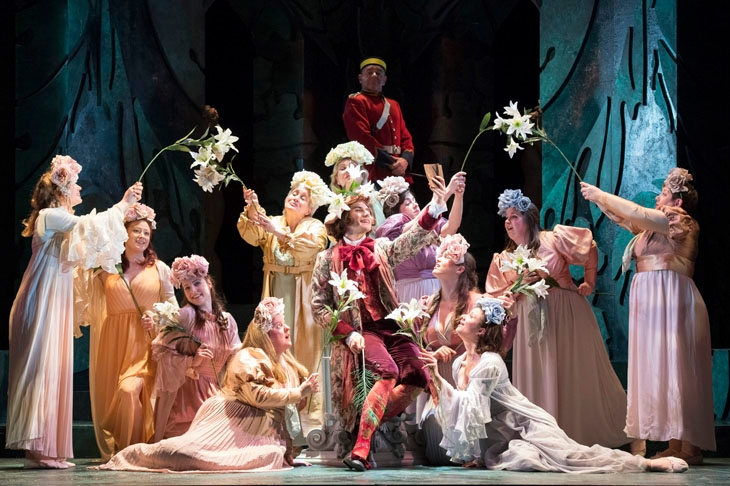English Touring Opera is playing safe this spring, with Tosca and Patience, and was rewarded, in Cambridge at least, with full houses. Its Tosca has been moderately reviewed, and that is about what it deserves. There is only one set, designed primarily with the tableau of chorus and soloists at the end of Act One in mind. Not at all atmospheric, it has to conjure up for us a church, a room in a palace, and dawn at the Castel Sant’Angelo, but scarcely succeeds with any of them.
The soloists have a heavy weight of responsibility, which only the Tosca of Paula Sides fully managed. She is fine-looking, slim, good at acting temperamentally, and a powerful singer, though a slightly short-breathed one. You could see why Scarpia is lustful, though forgetting God (as he claims she makes him) is rather extreme. Scarpia, Craig Smith, was low-keyed, neither the slobbering lecher one looks forward to, nor the smiling sadist who can give you the creeps; even so, Tosca made an unusually thorough job of stabbing him. Her beloved Cavaradossi, sung by Alexander James Edwards, a qualified plumber, so the biographical notes told us, was phlegmatic. Like all Cavaradossis, he belted out ‘Recondita armonia’, marked piano throughout, as if he was announcing that ‘None Shall Sleep’, and he was not good at expressing his passion for Tosca physically, but he did die well.
One of the problems with reducing the score of Tosca is that the orchestration may be the most interesting thing about it, and reveals Puccini’s mastery as no other aspect of the work does. The slimmed-down version, conducted with all his usual flair by Michael Rosewell, and well played, couldn’t suggest the sheer crushing viciousness of Scarpia or the syrup that Puccini pours over the lovers, so the result was mild, not really what you want this opera to be.
I have spent a moderate amount of my life trying to understand the delights of Gilbert & Sullivan, but the rewards have been slight. I have often enjoyed The Mikado in Jonathan Miller’s ENO production, and hope that I shall see it again. But as I try one after another of the others I have to admit to myself, well before half-time, that I am bored. The fact that almost everyone around me in the theatre is alternating laughter and applause doesn’t help. I know that Gilbert is a brilliant paradoxologist and rhymer, and that Sullivan was a tunesmith of genius. But it is all so harmless. Satire is a sad art, because, as is often pointed out, it changes nothing, while its whole aim is to make a difference. You could say the same about the Sermon on the Mount, though some would disagree. But with G&S the trouble is that the satire is insipid, showing more affection for its objects than the contempt that is a necessary ingredient, so the pleasure that its audience gets is a matter of complicity, a feeling that they know how absurd this or that object of satire is but love it all the more for being like that.
Patience seems a paradigm of that. This production has been hailed, and to judge from the rest of the audience it was hilarious. And in a thoughtful note in the programme booklet Carolyn Burdett argues that it signals the countercultural vitality of aestheticism in the late Victorian period, and that Wilde drew as much from the work’s central character Bunthorne as he inspired it. The serious question about aestheticism, however, is how it was and still is related to homosexuality, and that is something that G&S avoid. Indeed, my deepest objection to them is that their characters never exist below the waist, so that the desire that flows throughout Viennese and French operetta is neutered, the characters are really no more than the singers who portray them.
A couple of days later I was at the Snape Maltings for Mendelssohn’s Elijah, a work I hadn’t heard for several decades. It was great to see the massed forces of the Halifax and the Ipswich choral societies, and in a relatively confined space, and to hear their full-throated delivery of this once so popular music, admirably conducted by Robin Walker. The soloists were variable, with Garry Magee, in the title role, sounding woofy and unclear. In a chapter of his book The Romantic Generation, in which Charles Rosen discusses Mendelssohn and the invention of religious kitsch, he nails with lethal accuracy what is wrong with this music: great religious art offers comfort, often after great struggles; Mendelssohn makes us comfortable. There is no disturbing music in this oratorio, it is easy listening which deals, for much of its length, with a subject that demands much more than that.






Comments